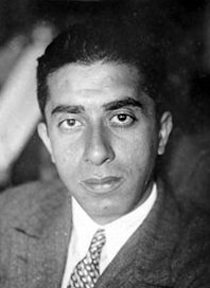Khachaturian, Waltz from Masquerade
 The Russian/Armenian composer Aram Khachaturian (1903-1978) might be the poster-child for the Soviet arts policy. Although he was briefly denounced in 1948 along with Shostakovich and Prokofiev, that move has generally been attributed to “guilt by association,” and he quickly regained his standing with the authorities.
The Russian/Armenian composer Aram Khachaturian (1903-1978) might be the poster-child for the Soviet arts policy. Although he was briefly denounced in 1948 along with Shostakovich and Prokofiev, that move has generally been attributed to “guilt by association,” and he quickly regained his standing with the authorities.
Khachaturian moved from his native Tbilisi to Moscow in 1922 to enter the Gnesin Music Academy. He had little musical training other than playing in the band and self study on piano. But he learned quickly, entered the Moscow Conservatory, and made a name for himself as a composer. By 1935 Prokofiev was recommending his works for performance.
Khachaturian described his background and influences:
I grew up in an atmosphere rich in folk music: popular festivities, rites, joyous and sad events in the life of the people always accompanied by music, the vivid tunes of Armenian, Azerbaijani and Georgian songs and dances performed by folk bards [ashugs] and musicians — such were the impressions that became deeply engraved on my memory, that determined my musical thinking. They shaped my musical consciousness and lay at the foundations of my artistic personality… Whatever the changes and improvements that took place in my musical taste in later years, their original substance, formed in early childhood in close communion with the people, has always remained the natural soil nourishing all my work.
While not celebrated internationally to the same degree as Prokofiev and Shostakovich, Khachaturian’s embodied the Soviet ideal by being born among the proletariat, incorporating native folklore into his music, and combining it all with the formal training and influence of established Russian traditions.
Khachaturian excelled in rousing themes depicting visual scenes. You probably know, or would immediately recognize, the iconic “Saber Dance” from his ballet Gayane. He composed 25 film scores, including the highly successful 1954 Spartacus.
Masquerade was composed in 1941 as incidental music to the play by the famous Russian poet Mikhail Lermontov. This Waltz was one of five movements later taken to make up an orchestral suite.



